|
|
|
Sort Order |
|
|
|
Items / Page
|
|
|
|
|
|
|
| Srl | Item |
| 1 |
ID:
077273
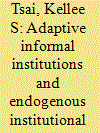

|
|
|
| 2 |
ID:
149835
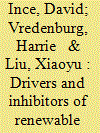

|
|
|
|
|
| Summary/Abstract |
We explore the factors that affect the development of renewable energy in the Caribbean. The Caribbean region can serve as a laboratory in studying the institutional issues relating to energy development due to the differences in political jurisdictions over a short distance. Based on 12 case studies and 75 in-depth interviews with a variety of stakeholders, we identified five factors that appear to be critical for the development of renewable energy in the Caribbean: entrepreneurship attitudes, the role of local champions, the electric utility influence, informal institutions and the influence of international agencies.
|
|
|
|
|
|
|
|
|
|
|
|
|
|
|
|
| 3 |
ID:
181881
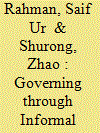

|
|
|
|
|
| Summary/Abstract |
In their post-authoritarian period, civilian governments in transitional democracies have often been battered by unelected power centers. Where do these unelected forces derive their power? This article addresses this question through a case study of Pakistan. Since the 2018 elections, a decade after leaving formal political office, the Pakistani military has asserted greater control over civilian government. Using the concept of informal institutions of political participation as an analytical framework, we argue that when formal forms of control become untenable due to legitimacy and/or functional constraints, the military turns into a Janus-faced institution, visibly acting as a formal state organ while invisibly protecting its institutional interests through what we call “informal mechanisms.” The article explains how Pakistan’s pre-2018 political situation dictated a quasi-military regime more suited to the military’s interests than direct military rule.
|
|
|
|
|
|
|
|
|
|
|
|
|
|
|
|
| 4 |
ID:
146054
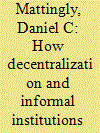

|
|
|
|
|
| Summary/Abstract |
Political decentralization is often argued to strengthen political accountability by bringing government closer to the people. Social and civic institutions at the local level, such as lineage associations, temples, churches, or social clubs, can make it easier for citizens to monitor officials and hold them accountable. This article argues that strong social institutions also empower local elites who may use their informal influence to control their group and capture rents. Drawing on evidence from case studies of Chinese villages, the article shows that lineage group leaders who become village officials use their combination of social and political authority to confiscate villagers’ land. Evidence from a survey experiment suggests that endorsement of a land confiscation plan by lineage elites elicits greater compliance with property seizures. A national survey indicates that when a lineage leader becomes a village cadre, it is associated with a 14 to 20 percent increase in the likelihood of a land expropriation. The findings demonstrate how informal institutions and local civil society can be tools of top-down political control.
|
|
|
|
|
|
|
|
|
|
|
|
|
|
|
|
| 5 |
ID:
167348
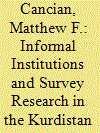

|
|
|
| 6 |
ID:
172889


|
|
|
|
|
| Summary/Abstract |
Contemporary writing on North African borderlands invokes the idea of a general, unregulated porosity through which small-scale informal traders of food or textiles move alongside drug smugglers and terrorists. I challenge that conception, demonstrating that the vast majority of smuggling activity is in fact highly regulated through a dense network of informal institutions that determine the costs, quantity, and types of goods that can pass through certain nodes, typically segmenting licit from illicit goods.
While informal, the institutions regulating this trade are largely impersonal and contain third-party enforcement, hence providing a direct empirical challenge to common characterisations of informal institutions in political science. I argue that revisiting the characteristics associated with informal institutions, and understanding them as contingent on their political environment, can provide a new starting point for studying institutions, the politics of informality, state capacity, and the regulation of illegal economies.
|
|
|
|
|
|
|
|
|
|
|
|
|
|
|
|
| 7 |
ID:
154385
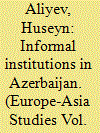

|
|
|
|
|
| Summary/Abstract |
Research on informal aspects of the post-communist economy and political institutions has developed rapidly since the collapse of the Soviet Union. While there is no lack in research on informal practices in Russia and other Eastern European countries, comprehensive empirical investigations of informality in peripheral regions of the former Soviet Union—such as the Caucasus and Central Asia—are still rare. This article aims to fill this gap by providing an evidence-based empirical account of informal practices in post-Soviet Azerbaijan. Drawing its empirical data from a two-decade-long ethnographic participant observation carried out in various locales of Azerbaijan’s capital, Baku, this study offers nuanced insights into the hitherto unexplored informal practice of tapsh.
|
|
|
|
|
|
|
|
|
|
|
|
|
|
|
|
| 8 |
ID:
140178
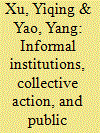

|
|
|
|
|
| Summary/Abstract |
Do informal institutions, rules, and norms created and enforced by social groups promote good local governance in environments of weak democratic or bureaucratic institutions? This question is difficult to answer because of challenges in defining and measuring informal institutions and identifying their causal effects. In the article, we investigate the effect of lineage groups, one of the most important vehicles of informal institutions in rural China, on local public goods expenditure. Using a panel dataset of 220 Chinese villages from 1986 to 2005, we find that village leaders from the two largest family clans in a village increased local public investment considerably. This association is stronger when the clans appeared to be more cohesive. We also find that clans helped local leaders overcome the collective action problem of financing public goods, but there is little evidence suggesting that they held local leaders accountable.
|
|
|
|
|
|
|
|
|
|
|
|
|
|
|
|
| 9 |
ID:
182594
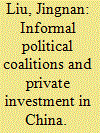

|
|
|
|
|
| Summary/Abstract |
This article attempts to estimate the effects of informal political coalitions on China's private investment. Theoretically, the party-state clients of China's supreme leaders are expected to have stronger incentives to foster economic growth. One way of doing so is to encourage private investment by reducing its political risks. Analysis of provincial-level panel data from 1993 to 2017 shows that personal connections—based on shared experience in the same work unit—between provincial leaders and the Chinese Communist Party's incumbent supreme leader significantly increase the growth rate of private investment. This suggests that informal institutional relations may assist the development of China's private economy by partially compensating for the weaknesses of formal rule-of-law institutions.
|
|
|
|
|
|
|
|
|
|
|
|
|
|
|
|
| 10 |
ID:
120725


|
|
|
|
|
| Publication |
2013.
|
| Summary/Abstract |
As Muslim communities reassert themselves in public life across the world, including Central Asia, their actions are causing tension in relations with 'secular' governments. Various global theories have been offered to explain these dynamics. According to one theory, tension between religious communities and secular states is caused by the exclusion or marginalization of Muslims, a process exacerbated by the perceived anti-Muslim bias in the foreign- and domestic-security policies of Central Asian states. A second view is that tension results from the work of global extremist groups espousing the restoration of an Islamic Caliphate. The third approach presents the rising tension as part of a broader trend: a putative clash of Western and Muslim civilizations. This article challenges these theories by using a case study of a Muslim grassroots protest in Kyrgyzstan to highlight the importance of local politics, namely informal arrangements among local officials, power brokers and community members. In so doing, it seeks to make a contribution to theorizing Muslim-state relations in Central Asia.
|
|
|
|
|
|
|
|
|
|
|
|
|
|
|
|
| 11 |
ID:
147637


|
|
|
|
|
| Summary/Abstract |
There is scepticism about whether a state like Australia can secure its interests and exercise influence on the United Nations Security Council (UNSC). A case study of Australia’s experience as a UNSC member in 2013–2014 shows that it directly influenced UNSC decision-making in a number of ways: first, in the response to the MH17 incident; second, pushing forward UNSC practice through the first-ever resolutions on both ‘small arms and light weapons’ and police in peacekeeping; and third, as chair of three sanctions committees, influencing the decision-making environment towards greater transparency. While Australia did not achieve all its objectives, it made its views well-known. A second case study demonstrates that Australia’s opportunities to influence UNSC decision-making are not limited to stints of membership. Australia was able to achieve many of its foreign policy objectives in East Timor in 1999 through strategically engaging with key UNSC players through an informal diplomatic grouping: the Core Group on East Timor. Both case studies show that Australia’s diplomatic engagement with the UNSC is desirable, necessary and strategic, whether or not it is a current or prospective member.
|
|
|
|
|
|
|
|
|
|
|
|
|
|
|
|
| 12 |
ID:
145826
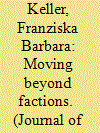

|
|
|
|
|
| Summary/Abstract |
Informal connections play an important role in regimes all across the world, but among China's political elite, it is particularly factional affiliation that is said to structure contention over who will rule and who will fall victim to a purge. This article identifies two approaches to measuring factional ties in the literature: the exploratory approach traces alliance ties through qualitative assessment of insider sources, while the structured approach uses publicly available data to infer factions from shared characteristics. The article combines the two by arguing that informal politics is better conceptualized as a process of alliance formation shaped by an underlying social (network) structure. Among the structured approaches, coworker networks best capture the latter, but this can be further refined by noting the number of instances of working together, or by taking into account promotions that have occurred while the two individuals were coworkers.
|
|
|
|
|
|
|
|
|
|
|
|
|
|
|
|
| 13 |
ID:
170812
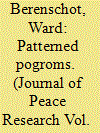

|
|
|
|
|
| Summary/Abstract |
The regular occurrence of election-related violence between ethnic or religious communities has generated a burgeoning literature on ‘the dark side’ of democracy. This literature provides convincing accounts of how political competition incentivizes politicians to foment violence. Yet such elite-oriented approaches are less convincing in explaining why and how political elites succeed in mobilizing people who do not share their concern for electoral benefits. This article addresses this challenge by relating the capacity of politicians to foment violence to the everyday functioning of patronage networks. Using ethnographic fieldwork to compare violent and nonviolent areas during Hindu–Muslim violence in Gujarat (2002) and Christian–Muslim violence in North Maluku (1999–2000), I find that the informal networks through which citizens gain access to state benefits (‘patronage networks’) shape patterns of election-related violence between religious communities. Politicians succeeded in fomenting violence in areas where citizens depended strongly on ethnicized patronage networks, while violence was averted in areas where state–citizen interaction was organized through networks that bridge religious divides. Interpreting this finding, I argue that patronage networks generate both infrastructure and incentives to organize violence. They provide the infrastructure for violence because their everyday functioning generates interdependencies between politicians and local followers that facilitate the instigation and organization of violence. Patronage networks also generate incentives for violence because when prevailing patronage networks bridge social divides, politicians relying on these networks have an interest in preventing communal violence. When socio-economic changes cause patronage networks to become organized along religious divides, as occurred in the violent areas in Gujarat and North Maluku, divisive political discourse is more likely to resonate and political actors are more likely to benefit electorally from communal violence. In this manner this article provides a novel explanation for both subnational variation in patterns of violence and the hardening of social divisions.
|
|
|
|
|
|
|
|
|
|
|
|
|
|
|
|
| 14 |
ID:
151379
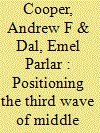

|
|
|
|
|
| Publication |
International Journal Vol: 71 No 4.
|
| Summary/Abstract |
This article argues that middle power diplomacy can be identified as having gone through three distinct waves. The first is connected with the immediate post-1945 global order, with a focus on multilateralism via the United Nations and related bodies. The second moved to ad hoc bursts of activism related to specific issue area niches. The third and current wave, by contrast, is embedded in the informal institutionalization associated with the G20. Just as the BRICS have used the G20 as a catalyst for differentiated activities both around and independent of the G20, the “missing middle” in the G20 (countries increasingly portrayed as middle powers beyond both the BRICS and the G7) have begun to explore the possibility of collective action. MIKTA (Mexico, Indonesia, Turkey, South Korea, and Australia), while possibly a significant advance in global governance, has the potential of hardening the categories of countries identified as middle powers. At the same time, the MIKTA countries face a number of serious constraints in terms of this global reach. Institutional elevation is compromised by practice limitations, most notably the hold of regional imperatives.
Keywords
|
|
|
|
|
|
|
|
|
|
|
|
|
|
|
|
| 15 |
ID:
103908
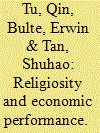

|
|
|
|
|
| Publication |
2011.
|
| Summary/Abstract |
We use results from a household survey to explore the relation between religiosity and our proxy for income among herders in rural Tibet. Our main results are twofold. First, there exists a positive relation between the intensity of religious beliefs (the main 'output' of the religious production process) and income - beliefs about the afterlife affect production and savings decisions today. Second, and perhaps more surprising, we find an inverted U-shaped relation between religious 'inputs' (time and money spent in the temple) and income. While it is possible to use too much resources as religious inputs, we find that the great majority of the respondents is on the upward sloping part of the curve linking economic performance to religious inputs. We present tentative evidence that the positive impact of religiosity and income may be explained by status (reputation) and information effects associated with producing religiosity.
|
|
|
|
|
|
|
|
|
|
|
|
|
|
|
|
| 16 |
ID:
181135
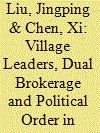

|
|
|
|
|
| Summary/Abstract |
Drawing on an ethnographic study in two counties in Hunan province, this article explores how political brokerage has contributed to political order in China by facilitating contentious and non-contentious bargaining between the government and ordinary people. To account for the changing role of village leaders in rural politics, the article develops a concept of dual brokerage. This concept not only recognizes formal and informal linkages between village leaders and the two principals – the government and the community of villagers – but also underscores the interactivity between the linkages. We contend that despite the tensions between village leaders’ roles as state agents and as village representatives, these two roles in the reform era tend to be mutually beneficial. Under such an institutional configuration, village leaders in China in the reform era have strong incentives to act as dual agents and can make policy implementation more flexible and the use of state force more moderate. A comparison between the trilateral interactions before and after the tax reform in 2005 confirms that whether village leaders can effectively act as dual agents has a significant impact on the quality of rural governance in China.
|
|
|
|
|
|
|
|
|
|
|
|
|
|
|
|
|
|
|
|
|